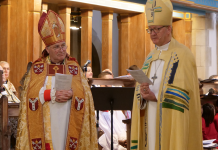Response to the latest statement from the House of Bishops.
Church Society welcomes the recent pastoral statement from the House of Bishops concerning civil partnerships.
Specifically, we are grateful to the House for reaffirming the traditional and orthodox view of marriage (see paragraphs 7 and 35), and for clarifying that “sexual relationships outside heterosexual marriage are regarded as falling short of God’s purposes for human beings” (paragraph 9).
The statement also helpfully points out some of the inherent ambiguity about the place of sexual relationships in civil partnerships and thus concludes that “we do not believe that it is possible for the church unconditionally to accept civil partnerships as unequivocally reflecting the teaching of the church” (paragraph 19). They are right to acknowledge the positive value of committed friendships in the Christian tradition (paragraph 21).
They reassert the existing expectation that clergy in civil partnerships should be expected to give reassurances concerning those relationships and are clear that “[w]hile clergy are fully entitled to argue, in the Living in Love and Faith process and elsewhere, for a change in that teaching, they are not entitled to claim the liberty to set it aside.” There is also some useful clarification around the implications of converting from a marriage to a civil partnership.
However it is disappointing to see that once again the clear statement regarding sexual relationships outside heterosexual marriage is not followed through with respect to the sacraments and godly church discipline (paragraphs 29-30).
The statement concludes:
“With opposite sex civil partnerships, and with those for same sex couples, the Church’s teaching on sexual ethics remains unchanged. For Christians, marriage – that is the lifelong union between a man and a woman, contracted with the making of vows – remains the proper context for sexual activity. In its approach to civil partnerships the Church seeks to uphold that standard, to affirm the value of committed, sexually abstinent friendships and to minister sensitively and pastorally to those Christians who conscientiously decide to order their lives differently.”
While we agree wholeheartedly with this statement, we continue to insist that pastorally sensitive ministry must include calling people to repent of their sin and exercising appropriate church discipline.
Given the confusion in our culture, and even in many of our churches, we believe the House of Bishops should be thanked for making such a courageous and counter-cultural statement.
We continue to have concerns about the trajectory of the Church of England, and some of the details of this statement, but pray that the House of Bishops will continue to provide the pastoral leadership that we need, in accordance with the revealed will of our Lord and Saviour.










